Pengyu Nie
Automated Modernization of Machine Learning Engineering Notebooks for Reproducibility
Feb 06, 2026Abstract:Interactive computational notebooks (e.g., Jupyter notebooks) are widely used in machine learning engineering (MLE) to program and share end-to-end pipelines, from data preparation to model training and evaluation. However, environment erosion-the rapid evolution of hardware and software ecosystems for machine learning-has rendered many published MLE notebooks non-reproducible in contemporary environments, hindering code reuse and scientific progress. To quantify this gap, we study 12,720 notebooks mined from 79 popular Kaggle competitions: only 35.4% remain reproducible today. Crucially, we find that environment backporting, i.e., downgrading dependencies to match the submission time, does not improve reproducibility but rather introduces additional failure modes. To address environment erosion, we design and implement MLEModernizer, an LLM-driven agentic framework that treats the contemporary environment as a fixed constraint and modernizes notebook code to restore reproducibility. MLEModernizer iteratively executes notebooks, collects execution feedback, and applies targeted fixes in three types: error-repair, runtime-reduction, and score-calibration. Evaluated on 7,402 notebooks that are non-reproducible under the baseline environment, MLEModernizer makes 5,492 (74.2%) reproducible. MLEModernizer enables practitioners to validate, reuse, and maintain MLE artifacts as the hardware and software ecosystems continue to evolve.
TokDrift: When LLM Speaks in Subwords but Code Speaks in Grammar
Oct 16, 2025Abstract:Large language models (LLMs) for code rely on subword tokenizers, such as byte-pair encoding (BPE), learned from mixed natural language text and programming language code but driven by statistics rather than grammar. As a result, semantically identical code snippets can be tokenized differently depending on superficial factors such as whitespace or identifier naming. To measure the impact of this misalignment, we introduce TokDrift, a framework that applies semantic-preserving rewrite rules to create code variants differing only in tokenization. Across nine code LLMs, including large ones with over 30B parameters, even minor formatting changes can cause substantial shifts in model behavior. Layer-wise analysis shows that the issue originates in early embeddings, where subword segmentation fails to capture grammar token boundaries. Our findings identify misaligned tokenization as a hidden obstacle to reliable code understanding and generation, highlighting the need for grammar-aware tokenization for future code LLMs.
A Tool for Generating Exceptional Behavior Tests With Large Language Models
May 28, 2025Abstract:Exceptional behavior tests (EBTs) are crucial in software development for verifying that code correctly handles unwanted events and throws appropriate exceptions. However, prior research has shown that developers often prioritize testing "happy paths", e.g., paths without unwanted events over exceptional scenarios. We present exLong, a framework that automatically generates EBTs to address this gap. exLong leverages a large language model (LLM) fine-tuned from CodeLlama and incorporates reasoning about exception-throwing traces, conditional expressions that guard throw statements, and non-exceptional behavior tests that execute similar traces. Our demonstration video illustrates how exLong can effectively assist developers in creating comprehensive EBTs for their project (available at https://youtu.be/Jro8kMgplZk).
Suggesting Code Edits in Interactive Machine Learning Notebooks Using Large Language Models
Jan 16, 2025Abstract:Machine learning developers frequently use interactive computational notebooks, such as Jupyter notebooks, to host code for data processing and model training. Jupyter notebooks provide a convenient tool for writing machine learning pipelines and interactively observing outputs, however, maintaining Jupyter notebooks, e.g., to add new features or fix bugs, can be challenging due to the length and complexity of the notebooks. Moreover, there is no existing benchmark related to developer edits on Jupyter notebooks. To address this, we present the first dataset of 48,398 Jupyter notebook edits derived from 20,095 revisions of 792 machine learning repositories on GitHub, and perform the first study of the using LLMs to predict code edits in Jupyter notebooks. Our dataset captures granular details of cell-level and line-level modifications, offering a foundation for understanding real-world maintenance patterns in machine learning workflows. We observed that the edits on Jupyter notebooks are highly localized, with changes averaging only 166 lines of code in repositories. While larger models outperform smaller counterparts in code editing, all models have low accuracy on our dataset even after finetuning, demonstrating the complexity of real-world machine learning maintenance tasks. Our findings emphasize the critical role of contextual information in improving model performance and point toward promising avenues for advancing large language models' capabilities in engineering machine learning code.
InterTrans: Leveraging Transitive Intermediate Translations to Enhance LLM-based Code Translation
Nov 05, 2024



Abstract:Code translation aims to convert a program from one programming language (PL) to another. This long-standing software engineering task is crucial for modernizing legacy systems, ensuring cross-platform compatibility, enhancing performance, and more. However, automating this process remains challenging due to many syntactic and semantic differences between PLs. Recent studies show that even advanced techniques such as large language models (LLMs), especially open-source LLMs, still struggle with the task. Currently, code LLMs are trained with source code from multiple programming languages, thus presenting multilingual capabilities. In this paper, we investigate whether such multilingual capabilities can be harnessed to enhance code translation. To achieve this goal, we introduce InterTrans, an LLM-based automated code translation approach that, in contrast to existing approaches, leverages intermediate translations across PLs to bridge the syntactic and semantic gaps between source and target PLs. InterTrans contains two stages. It first utilizes a novel Tree of Code Translation (ToCT) algorithm to plan transitive intermediate translation sequences between a given source and target PL, then validates them in a specific order. We evaluate InterTrans with three open LLMs on three benchmarks (i.e., CodeNet, HumanEval-X, and TransCoder) involving six PLs. Results show an absolute improvement between 18.3% to 43.3% in Computation Accuracy (CA) for InterTrans over Direct Translation with 10 attempts. The best-performing variant of InterTrans (with Magicoder LLM) achieved an average CA of 87.3%-95.4% on three benchmarks.
Multilingual Code Co-Evolution Using Large Language Models
Jul 27, 2023Abstract:Many software projects implement APIs and algorithms in multiple programming languages. Maintaining such projects is tiresome, as developers have to ensure that any change (e.g., a bug fix or a new feature) is being propagated, timely and without errors, to implementations in other programming languages. In the world of ever-changing software, using rule-based translation tools (i.e., transpilers) or machine learning models for translating code from one language to another provides limited value. Translating each time the entire codebase from one language to another is not the way developers work. In this paper, we target a novel task: translating code changes from one programming language to another using large language models (LLMs). We design and implement the first LLM, dubbed Codeditor, to tackle this task. Codeditor explicitly models code changes as edit sequences and learns to correlate changes across programming languages. To evaluate Codeditor, we collect a corpus of 6,613 aligned code changes from 8 pairs of open-source software projects implementing similar functionalities in two programming languages (Java and C#). Results show that Codeditor outperforms the state-of-the-art approaches by a large margin on all commonly used automatic metrics. Our work also reveals that Codeditor is complementary to the existing generation-based models, and their combination ensures even greater performance.
Learning Deep Semantics for Test Completion
Mar 07, 2023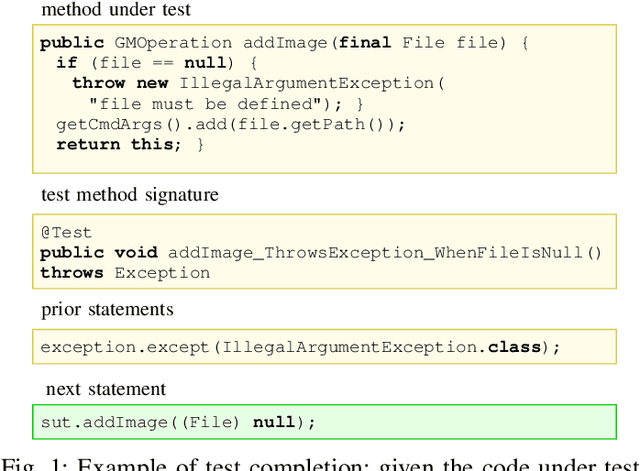

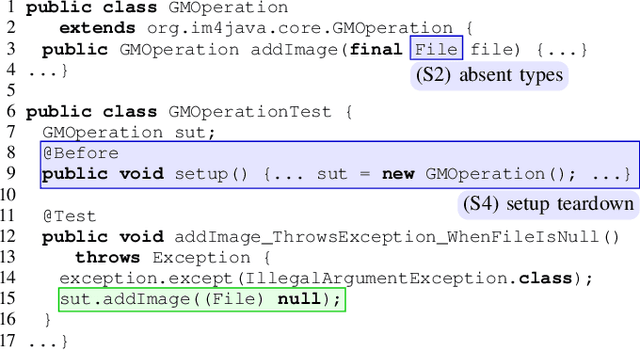
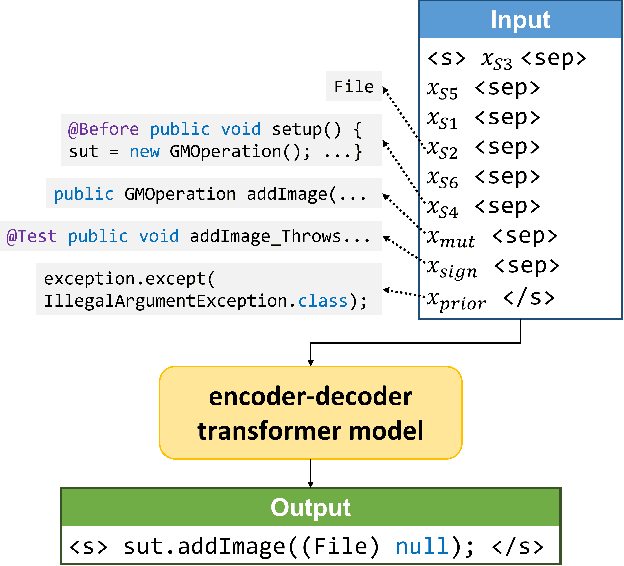
Abstract:Writing tests is a time-consuming yet essential task during software development. We propose to leverage recent advances in deep learning for text and code generation to assist developers in writing tests. We formalize the novel task of test completion to automatically complete the next statement in a test method based on the context of prior statements and the code under test. We develop TeCo -- a deep learning model using code semantics for test completion. The key insight underlying TeCo is that predicting the next statement in a test method requires reasoning about code execution, which is hard to do with only syntax-level data that existing code completion models use. TeCo extracts and uses six kinds of code semantics data, including the execution result of prior statements and the execution context of the test method. To provide a testbed for this new task, as well as to evaluate TeCo, we collect a corpus of 130,934 test methods from 1,270 open-source Java projects. Our results show that TeCo achieves an exact-match accuracy of 18, which is 29% higher than the best baseline using syntax-level data only. When measuring functional correctness of generated next statement, TeCo can generate runnable code in 29% of the cases compared to 18% obtained by the best baseline. Moreover, TeCo is significantly better than prior work on test oracle generation.
CoditT5: Pretraining for Source Code and Natural Language Editing
Aug 10, 2022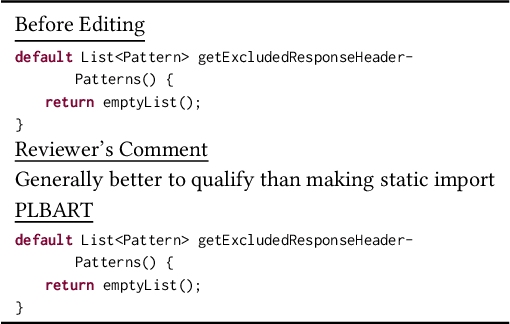

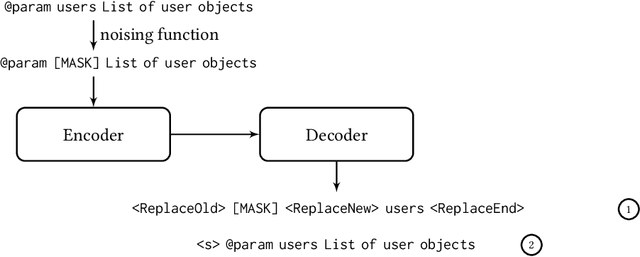
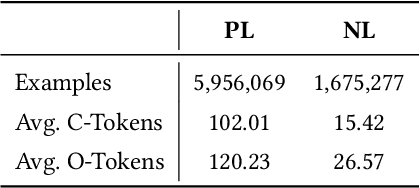
Abstract:Pretrained language models have been shown to be effective in many software-related generation tasks; however, they are not well-suited for editing tasks as they are not designed to reason about edits. To address this, we propose a novel pretraining objective which explicitly models edits and use it to build CoditT5, a large language model for software-related editing tasks that is pretrained on large amounts of source code and natural language comments. We fine-tune it on various downstream editing tasks, including comment updating, bug fixing, and automated code review. By outperforming pure generation-based models, we demonstrate the generalizability of our approach and its suitability for editing tasks. We also show how a pure generation model and our edit-based model can complement one another through simple reranking strategies, with which we achieve state-of-the-art performance for the three downstream editing tasks.
A Framework for Multi-stage Bonus Allocation in meal delivery Platform
Feb 22, 2022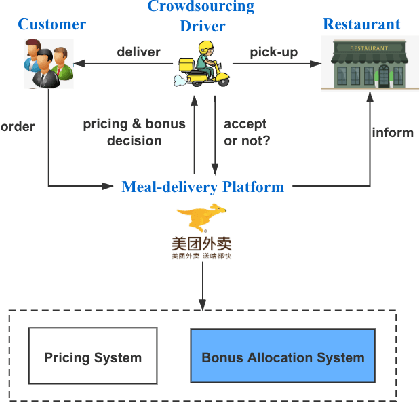


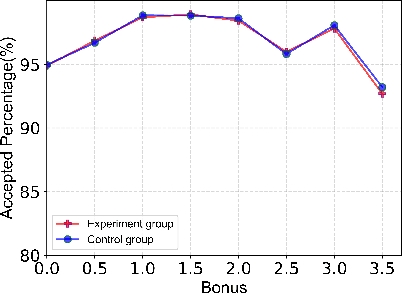
Abstract:Online meal delivery is undergoing explosive growth, as this service is becoming increasingly popular. A meal delivery platform aims to provide excellent and stable services for customers and restaurants. However, in reality, several hundred thousand orders are canceled per day in the Meituan meal delivery platform since they are not accepted by the crowd soucing drivers. The cancellation of the orders is incredibly detrimental to the customer's repurchase rate and the reputation of the Meituan meal delivery platform. To solve this problem, a certain amount of specific funds is provided by Meituan's business managers to encourage the crowdsourcing drivers to accept more orders. To make better use of the funds, in this work, we propose a framework to deal with the multi-stage bonus allocation problem for a meal delivery platform. The objective of this framework is to maximize the number of accepted orders within a limited bonus budget. This framework consists of a semi-black-box acceptance probability model, a Lagrangian dual-based dynamic programming algorithm, and an online allocation algorithm. The semi-black-box acceptance probability model is employed to forecast the relationship between the bonus allocated to order and its acceptance probability, the Lagrangian dual-based dynamic programming algorithm aims to calculate the empirical Lagrangian multiplier for each allocation stage offline based on the historical data set, and the online allocation algorithm uses the results attained in the offline part to calculate a proper delivery bonus for each order. To verify the effectiveness and efficiency of our framework, both offline experiments on a real-world data set and online A/B tests on the Meituan meal delivery platform are conducted. Our results show that using the proposed framework, the total order cancellations can be decreased by more than 25\% in reality.
Evaluation Methodologies for Code Learning Tasks
Aug 22, 2021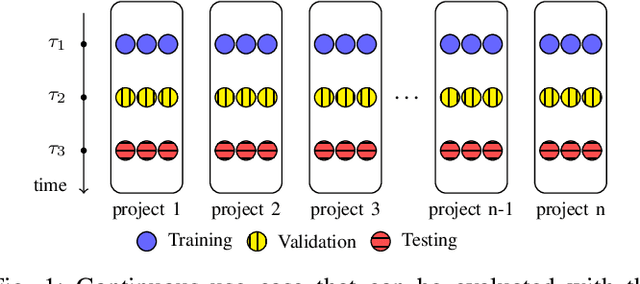
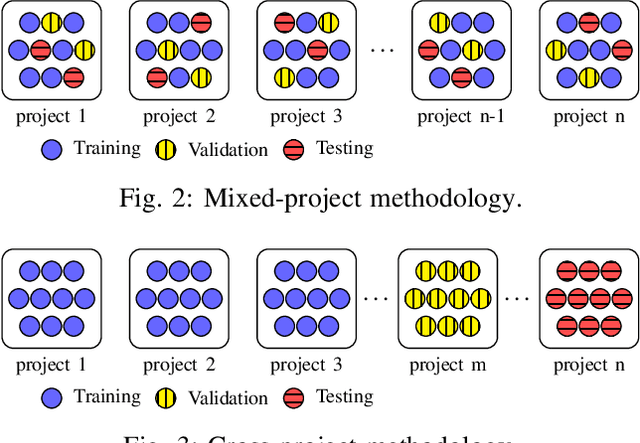
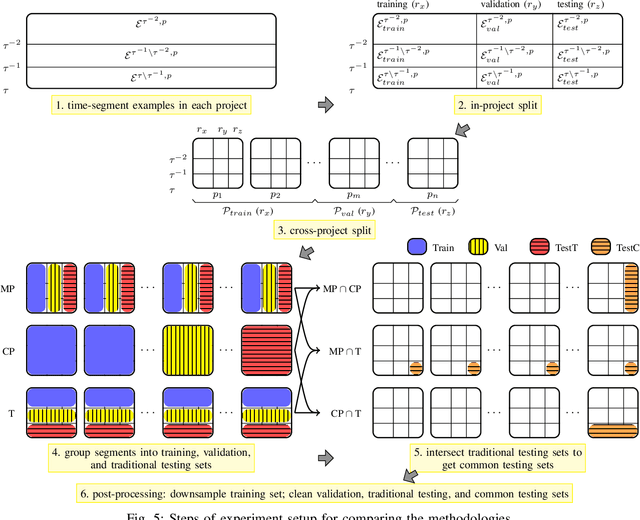
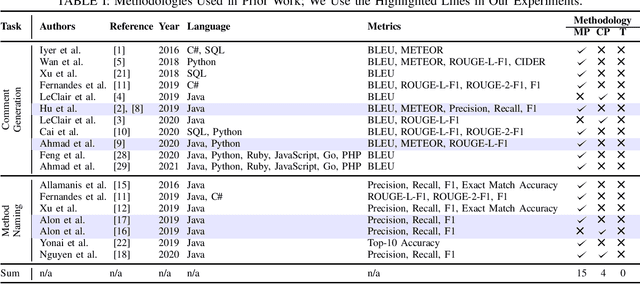
Abstract:There has been a growing interest in developing machine learning (ML) models for code learning tasks, e.g., comment generation and method naming. Despite substantial increase in the effectiveness of ML models, the evaluation methodologies, i.e., the way people split datasets into training, validation, and testing sets, were not well designed. Specifically, no prior work on the aforementioned topics considered the timestamps of code and comments during evaluation (e.g., examples in the testing set might be from 2010 and examples from the training set might be from 2020). This may lead to evaluations that are inconsistent with the intended use cases of the ML models. In this paper, we formalize a novel time-segmented evaluation methodology, as well as the two methodologies commonly used in the literature: mixed-project and cross-project. We argue that time-segmented methodology is the most realistic. We also describe various use cases of ML models and provide a guideline for using methodologies to evaluate each use case. To assess the impact of methodologies, we collect a dataset of code-comment pairs with timestamps to train and evaluate several recent code learning ML models for the comment generation and method naming tasks. Our results show that different methodologies can lead to conflicting and inconsistent results. We invite the community to adopt the time-segmented evaluation methodology.
 Add to Chrome
Add to Chrome Add to Firefox
Add to Firefox Add to Edge
Add to Edge